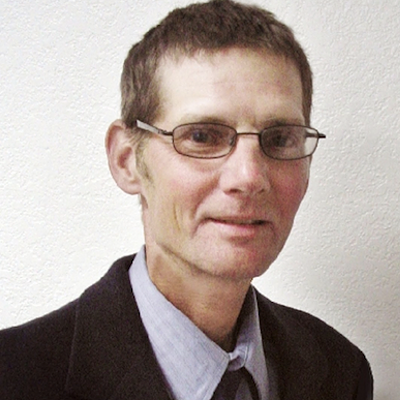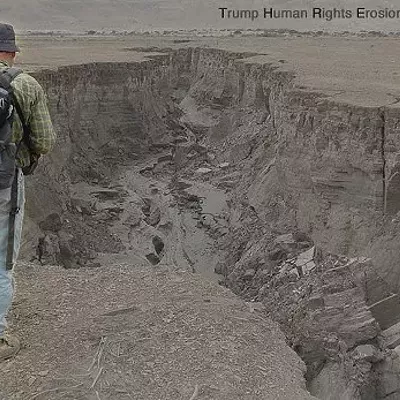And they have reason to worry, according to the City Council's senior member: Because of city accounting changes and reorganization, residents and other Tucson Water customers might also be forced to prop up commercial and residential garbage collection with monthly water payments.
The monthly residential garbage fee already must increase nearly 26 percent by July 2008, to $17.60, so the city can keep up with projected costs in Environmental Services, the garbage collection and landfill department that was swallowed up by Tucson Water in a bureaucratic shuffle last year. That is the break-even established by city garbage consultant R.W. Beck.
Commercial rates are already higher than what Beck recommended. Many of those business customers aren't paying the higher rates yet, but even when they become effective, they still won't cover all of the city's costs, particularly for the 35 commercial accounts the city services outside the city limits.
Whatever garbage is to the city--a gain or loss--it is a big enterprise. Just for the city's southside Los Reales Landfill, the city's commercial accounts and 141,500 residential customers create 330,000 tons a year. That's 103,125 Hummer H2s. Los Reales, where environmental and remediation costs are key to the city's garbage enterprise, receives 556,500 tons a year, or 173,906 of the 3.2-ton Hummer H2s.
In an accounting change that could end up being more about labeling, the City Council decreed that commercial garbage should be an enterprise fund that runs on the fees it collects. It seemed like the right move, but in government, deficits run up by so-called enterprise funds can be simply covered by taxes or other sources. The entire garbage service was then connected to Tucson Water and put under the management control of Tucson Water Director David Modeer.
Councilman Steve Leal, a Democrat who is seeking a fifth term representing southside Ward 5, says there is no guarantee that commercial garbage won't be subsidized by taxpayers or Tucson Water customers.
"It's bad enough residents have to pay twice," Leal says. "But if it theoretically is being run as an enterprise system, then why did it need to be under Tucson Water?"
As a utility, Tucson Water must bill related city departments for administrative costs. Leal says Tucson Water is charging the solid waste department exorbitant rates, including "$40,000 to put a line of ink on the water bill" that adds the monthly garbage fee. Tucson Water customers who live outside the city also worry that their payments will subsidize city garbage operations.
That is because true costs are going undetected and unreported in commercial garbage budgeting.
Commercial garbage revenues for the first seven months of the 2004-05 fiscal year were $3.92 million. At first glance, it seems positive. That puts the city about $300,000 ahead of the annual $6.41 million that R.W. Beck said was needed, but short of the $7.95 million in commercial garbage revenues called for in budget plans.
Expenses at first glance also appear encouraging, at more than $2.55 million for the first seven months or an annual rate of $4.37 million. But those figures are deceiving.
Responding to questions from the Weekly, city officials said late last month: "Significant other costs incurred in support of commercial (garbage) collection operations and other environmental costs, as well as various administrative and overhead costs, are not reflected."
Leal says he and others are frequently told that those administrative and overhead costs--that city garbage should pay other departments--amount to simple internal costs.
"They say, "Why should we pay ourselves?' But that is kind of doubletalk to me," Leal says.
Kathleen Dunbar, a Republican who is seeking a second term in northside Ward 3, goes several steps further.
"I don't think the city should be in the commercial garbage business. Trust me, I would have voted to privatize it if there were three other votes. And if we're subsidizing it, then it should be privatized," Dunbar says.
Competitors and some in City Hall say commercial garbage is losing money and won't be able to stem the losses when city accountants fully assess charges for dumping at Los Reales--like the fees private haulers pay--and full administrative costs.
It isn't as if those numbers don't exist. In fact the City Council paid R.W. Beck $30,000 to teach the numbers to the city during a council briefing and via a 41-page book.
R.W. Beck had little trouble breaking down the Tucson garbage numbers. Commercial garbage collection for a typical dumpster is $6.93 each trip; administrative cost is $2.05 per dumpster; disposal is 42 cents per yard; landfill remediation is 24 cents per yard; and dumpster maintenance is $13.37 per unit, per month.
But the city's earning picture grows more distorted, because its rates are already higher than what R.W. Beck proposed.
Under the Beck study, city revenue from its Dumpster collections will have to top $9.1 million in three years.
It won't be easy, city officials and Beck analysts say. The city has an aging fleet of trucks, and costs at Los Reales will only increase. And debt, from voter-approved bonds as well as other borrowing not requiring voter approval, will rise in all garbage operations from $3.9 million this year to $7.38 million for fiscal year 2008-09.
Personnel costs in the 260-person department have risen from $11 million in 2001 to $14.88 million this year, with total expenditures budgeted for $52.9 million. Personnel costs are expected to increase by more than $1 million next year while overall spending will shrink to $41.5 million, largely on the $15 million decrease--to $5.6 million--in capital expenses on equipment and facilities.
Private haulers of commercial garbage complain the city, backed by taxpayers and water customers, has an unfair advantage that still does not erase the deficit the city will face. For example, private haulers would be forced to pay dumping fees at the Los Reales, and the city would not face the extra cost of wear and tear created by long hauls to Marana and other out-of-city dumpsters. Finally, the city would be relieved of paying other municipalities in-lieu taxes for any commercial garbage routes they have in other cities.
All this comes as the City Council and incoming City Manager Mike Hein will be confronted by the challenge to ask Tucsonans to embrace the "pay as you throw" garbage fee that the consultant floated last year. It could provide a built-in sliding fee that assesses residents based on the garbage they generate.









